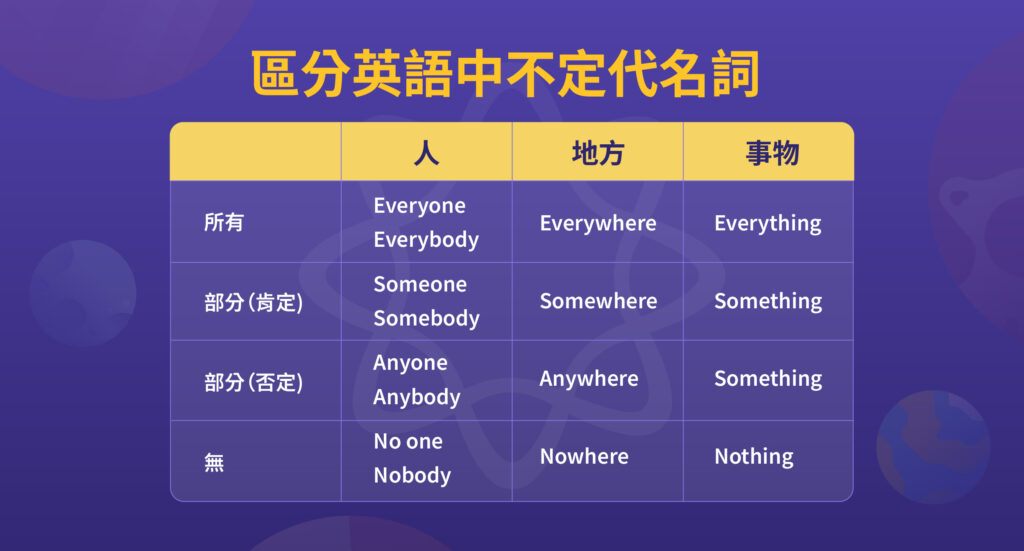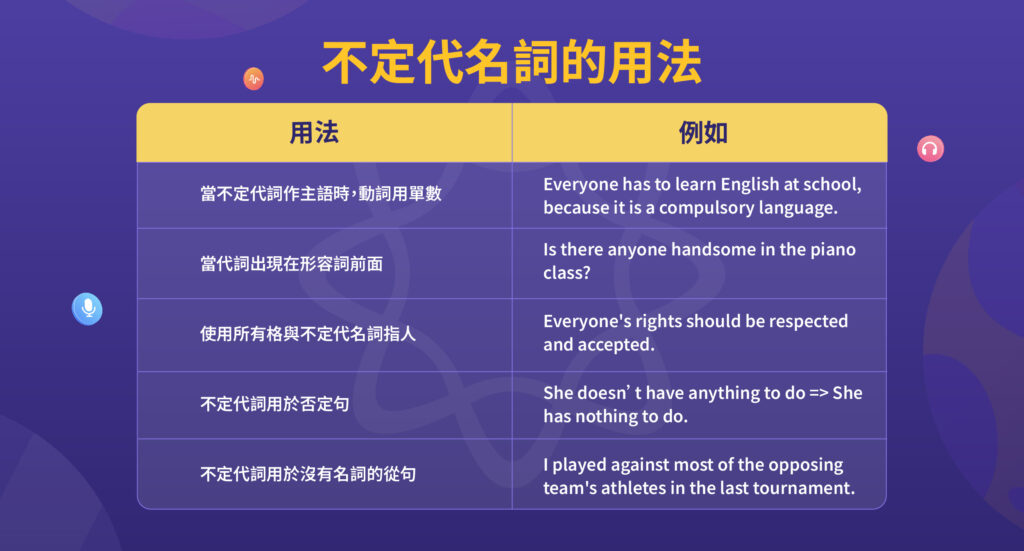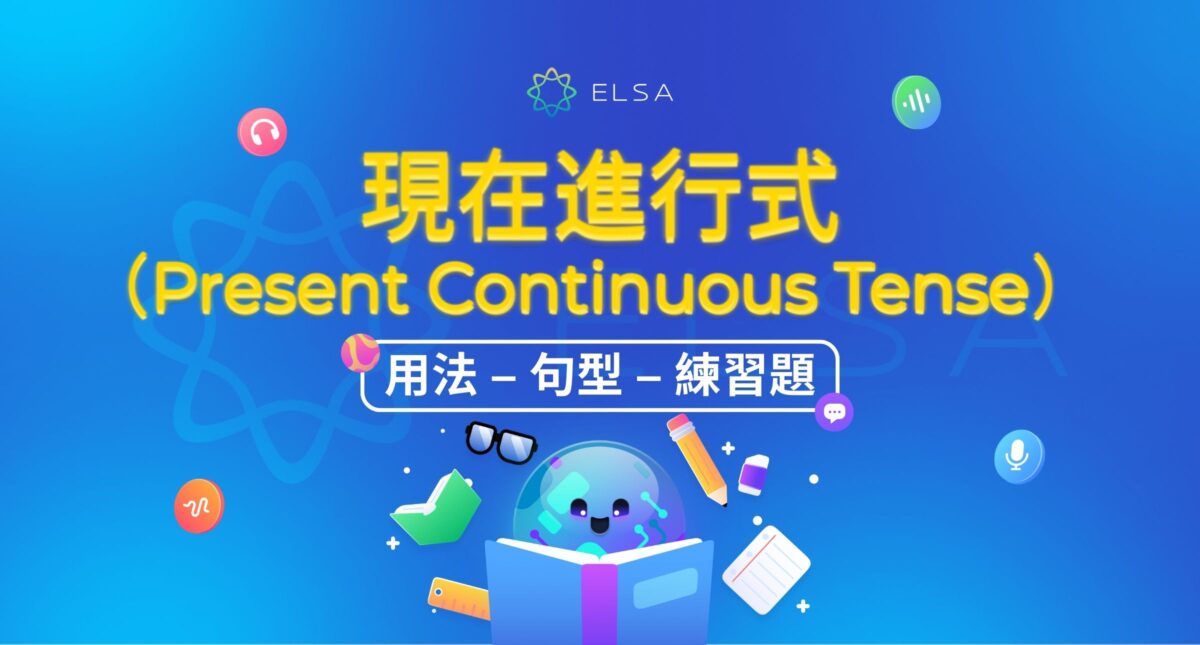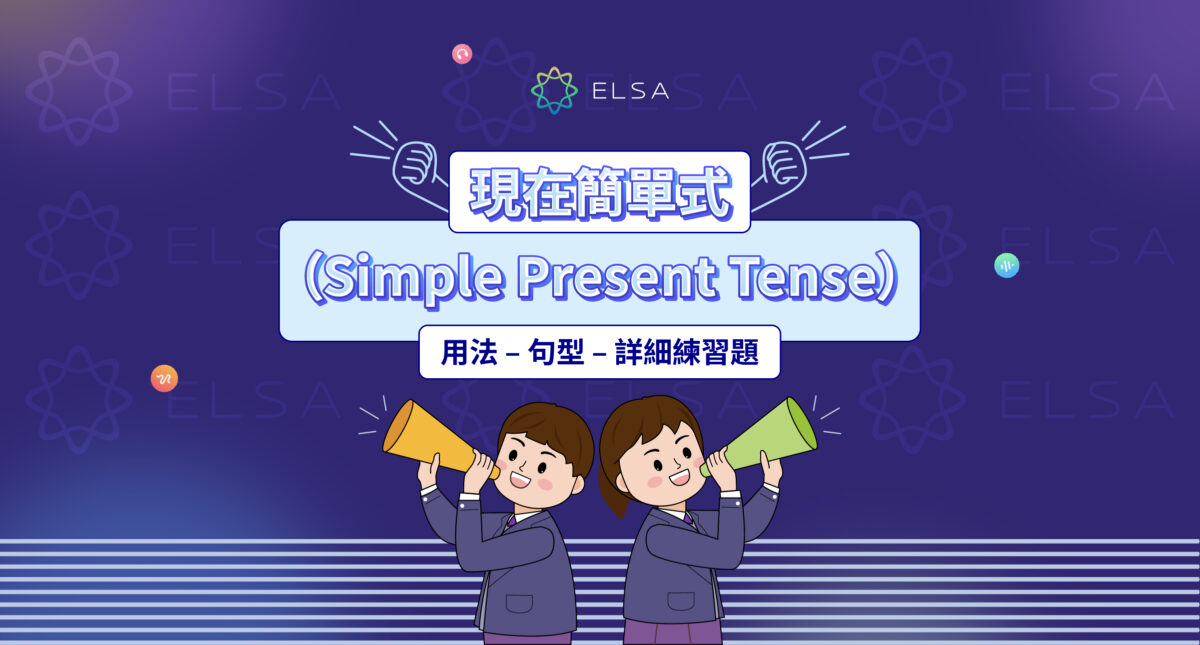不定代名词 (Indefinite pronouns) 是英語中 7 個常見代詞之一,經常出現在考試和日常用語中。 一起跟 ELSA Speak 來了解更多關於不定代詞的知識吧!
不定代名詞是什麽?
不定代名詞 (Indefinite pronouns) 指的是不特定的人、地方或事物。在英語中,有些不定代名詞是用量詞或個別詞形成,這類不定代名詞是以 any、some、every 和 no 開頭。
一些不定代詞:all, any, another, anybody/anyone, anything, everybody/everyone, each, everything, few, nobody, many, none, several, one, some, somebody/someone.
例如:
- Someone just called you but I told you you weren’t home.
大致翻譯: 剛剛有人打電話給你,但我說你不在家。
- Tomorrow, everyone must wear uniforms to perform the opening ceremony of the new school year.
大致翻譯: 明天,大家必須穿着校服來舉行新學年的開學典禮。

不定代名詞的位置
事實上,不定代名詞在句子中有許多不同位置。 具體來說:
不定代名詞作主語
不定代名詞用作主語來描述特定的人或事物,而不指定確切的名稱或正確的數量。
例如:
- No one listens to him just because he lied to them.
大致翻譯: 沒有人會聽他只因爲他曾經對他們撒過謊。
- Someone called you, but you went out.
大致翻譯: 有人打電話給你,但你出去了。
不定代名詞作賓語
不定代名詞用作動詞的賓語來表達一般或未指定的含義。
例如:
- She didn’t invite anyone to her birthday party.
大致翻譯: 她沒有邀請任何人參加她的生日聚會。
- She looks so lonely, because there’s no one around when she’s having a bad time.
大致翻譯: 她看起來很孤獨,因為當她遇到不幸的時候,沒有人在她身邊。
不定代詞位於介詞後面
不定代詞用作介詞的賓語來表達一般或未指定的含義
例如:
- She lied to everyone at the office not to go out just because she ran out of money.
大致翻譯: 她在辦公室里跟大家撒謊說她沒錢了所以不出去。
- He was talking to someone but he seemed very serious.
大致翻譯: 他正在和某人說話,但看起來很嚴重。

常見不定代名詞
單數代名指人
| 單數代名指人 | 大致翻譯 |
| Everybody, Everyone | 大家 |
| Someone, somebody | 某人 |
| Each | 每個人 |
| Anyone, anybody | 任何人 |
| Another | 另一個人 |
| No one, Nobody | 無人 |
| The other | 其他的 |
例如:
- Anyone can make their dreams come true, as long as you really try.
大致翻譯: 任何人都可以實現自己的夢想,只需要真正去嘗試。
- Everyone has their own life. So don’t judge anyone by their appearance.
大致翻譯: 每個人都有自己的生活。 因此,不要以外表來判斷任何人。
單數代名指物
| 單數代名指物 | 大致翻譯 |
| Each | 每個 |
| Nothing | 沒有什麼 |
| Everything | 一切 |
| Something | 某事 |
| Anything | 任何事物 |
| Another | 其他 |
例如:
- Everything in this house is hand-picked and decorated by me.
大致翻譯: 這房子里的一切都是我親自挑選和裝飾的。
- Anything needs to be carefully preserved to prepare for International Women’s Day October 20.
大致翻譯: 任何東西都需要小心保存,為 10 月 20 日國際婦女節做準備。
單數代名指人和物
| 單數代名指人和物 | 大致翻譯 |
| Both | 兩者 |
| Two others | 另外兩個 |
| Neither | 無一個 |
| Either | 任意一個 |
| The other two | 另外兩個 |
例如:
- Both Lan and I have dreams of becoming a great leader. So now we are doing our best to make it happen.
大致翻譯: 我和蘭都夢想成為一名有才華的領導者。 所以現在我們正在全力落實。
- Neither the homeroom teacher nor the parents know the thoughts of their teenage children.
大致翻譯: 班主任和家長都不知道十幾歲孩子的想法。
根據情況使用單數或複數代名
一些不定代名詞可以是單數或複數,具體取決於主體想要指代的內容(說話者可能想將主語稱為可數名詞或不可數名詞)。 這些代詞包括 all, any, more, most, none, some, such.
| 根據情況使用單數或複數代名 | 大致翻譯 |
| All | 全部,所有 |
| Some | 一些 |
| Any | 任何 |
| None | 沒有人 |
| Other | 其他 |
例如:
- All that food needs to be refrigerated before it goes bad.
大致翻譯: 所有這些食物在變質之前都需要存放在冰箱中。
- None of them achieved the success they wanted.
大致翻譯: 他們都沒有人取得自己想要的成功。

區分英語中不定代名詞

數量不定代名詞
數量不定代名詞是用來代替可數名詞,表達不定數量的詞語。
數量不定代名詞總表
| 單數代名 | 複數代名 | 根據情況使用單數或複數代名 | 不可數代名 | |
| One: 一 | Several: 幾個 A few: 一些 Few: 幾乎沒有Fewer: 較少 Many: 很多 | More: 更多 Most: 最多 | Enough: 足夠 A little: 一點點 Little: 幾乎 Less: 較小 Much: 很多 | |
| 例如 | Out of all my classmates, there is only one I don’t want to be friends with. 大致翻譯:在我所有的同學中,只有一個人是我不想成為朋友的。 | Many are called, but few are chosen. 大致翻譯:被叫來的人很多,但被選中的人卻很少。 | 不可數名詞 There’s no salt left in the pot. More is added later. 大致翻譯:罐子里沒有鹽了。 它們將在稍後添加。 复数名词 This paragraph lacks words. More are added later. 大致翻譯:這一段漏字了。 它們將在稍後添加。 | Although this book is very famous, little is known about the author of it. 大致翻譯:雖然這本書非常有名,但是幾乎沒有關於作者的信息。 |
>>閲讀更多:although 用法:詳細解釋、例句與應用練習

不定代名詞的用法
英語中的不定代名詞常常讓很多人在使用時需要注意句子中的動詞而造成“困惑”。 以下是各個不定代名詞的詳細用法說明供您參考。
當不定代詞作主語時,動詞用單數
最常見的不定代名詞,例如: someone, something, anybody, anything, nobody, nothing, each, every, either, neither, another, one 都有一個單數的含義。 因此,在使用這些代名詞作為主語時,我們也會使用單數動詞來表示主語和動詞數量上的一致。
例如:
- Everyone has to learn English at school, because it is a compulsory language.
大致翻譯:每個人都必須在學校學習英語,因為這是一門必修語言。
- Someone spilled this pot, causing the soil to fall all over the floor.
大致翻譯:有人打翻了種這種植物的花盆,土掉一地上。
- Looks like someone is here. I have heard someone calling for help many times.
大致翻譯:看起來有人在這裡。 我多次聽到有人呼救。
當代詞出現在形容詞前面
不定代名詞可以放在形容詞前面,具有表達某事或某人的狀態或品質的含義。
例如:
- Is there anyone handsome in the piano class?
大致翻譯:鋼琴班有帥哥嗎?
- Anyone want to go out and enjoy the breeze with me?
大致翻譯:有人想和我一起出去透氣嗎?
使用所有格與不定代名詞指人
不定代名詞指人在所有格中使用,以表達對某個群體的總體所有權。 要將所有格與不定代名詞一起使用,請在不定代名詞後面添加 s。
例如:
- Everyone’s rights should be respected and accepted.
大致翻譯:每個人的權利都應該得到尊重和接受。
- It’s nobody’s business. It’s a common job for everyone to do.
大致翻譯:這不關任何人的事。 這是大家一起做的公幹。
不定代詞用於否定句
否定句中(含 not)、使用不定代詞組 any- (anything, anywhere, anyone).
在具有否定含義(不包含 not)的句子中,使用前綴為 no- (nobody, no one, nowhere) 的不定代名詞,而不使用前綴為 any-的代名詞。
例如:
- She doesn’t have anything to do => She has nothing to do.
大致翻譯:她沒什麼事可做。
- He doesn’t have anything to give you => He has nothing to give you.
大致翻譯:他沒有什麼可以給你的。
不定代詞用於沒有名詞的從句
不定代名詞用來代替可數或不可數名詞,表達不定的數量。 當用於沒有名詞的從句時,不定代名詞通常充當句子的主語或賓語。
例如:
- I played against most of the opposing team’s athletes in the last tournament.
大致翻譯:在上屆比賽中我幾乎與方球隊的大多數運動員比過賽。
- Out of all the teachers at my school, there’s only one I don’t like.
大致翻譯:在我學校的所有老師中,只有一位我不喜歡。
注意:為了更清楚地表達句子的意思,可以使用這樣的結構:不定代詞 + of + 名詞短語。 “of” 後面的名詞短語必須附有限定詞 “the” 或所有格形容詞,例如:your、my、their、…

使用不定代詞時的注意
英語中不定代名詞的使用方法除了上述之外,還需要注意以下幾點:
如果在句子中使用了帶有否定含義的不定代名詞,那就不會使用“not”。
例如:
- No one can answer that question = Everyone cannot answer that question.
大致翻譯:沒有人能回答那個問題。
在否定從句中,我們使用帶有前綴 no- 而不是 any- 的不定代名詞。
例如:
- Nobody knows who he is – 沒有人知道他是誰,而不是 Anybody knows who he is – 誰都知道他是誰.
當動詞與不定代名詞變位時,要注意動詞的單數和複數。
不定代名詞練習及答案
練習 1: 選擇正確的答案
1. She went shopping yesterday but she couldn’t find ………. that I liked.
A. nothing B. anything C. everywhere
2. ate ………. in her lunch bag except for the carrot.
A. everything B. anything C. somebody
3. Excuse me, waiter. There’s ………. in my soup. I think it’s a fly.
A. something B. anywhere C. everywhere
4. She didn’t go ………. on his holiday. She was so bored!
A. nowhere B. somewhere C. anywhere
5. My brother thinks intelligent aliens may exist ………. in the universe.
A. anyone B. something Cnowhere
6. ………. answered her phone when she called an hour ago.
A. No one B. Anyone C. Nowhere
7. My brother puts my glasses ………. in his office but he can’t remember exactly where.
A. somewhere B. everywhere C. anywhere
8. ………. ate my candy! Who? Who ate my candy?
A. Anything B. Somebody C. Anybody
9. My parents can’t meet me tomorrow because I have ………. important to do.
A. somewhere B. something C. nothing
10. ………. is more important than having friends and family who love you.
A. Everyone B. Somewhere C. Nothing
11. ………. in my class passed the grammar test!
A. Everything B. Everyone C. Something
12. Did you guys do ………. interesting on the weekend?
A. anything B. anywhere C. somewhere
13. ………. can lift this box! It’s too heavy to lift.
A. No one B. Something C. Anybody
14. Almost ………. in the world knows about the Olympic games.
A. somewhere B. everywhere C. everyone
15. Some scientists believe there is alien life ………. in our solar system.
A. something B. somewhere C. anything
16. There are still plenty of empty seats. We can sit ………. we like.
A. anything B. anyone C. anywhere
17. There’s ……………… in the room. I can hear some noise.
A. anyone B. someone C. no one
18. ……………. believed in what he said. He lied to them so many times.
A. Anyone B. No one C. Everyone
19. She put ……………… in the carton, all the things she had.
A. everything B. nothing C. anything
20. I went ……………….. last week. I stayed at home.
A. everywhere B. nowhere C. anywhere
21. “What’s wrong with you?” – “………………., I’m okay.”
A. None B. Nothing C. No one
22. In conclusion, the importance of luck in determining goal achievement is overstated, while there are much more significant factors to consider, namely hard work and determination. It is recommended that ______ who wants to pursue their dream should develop a strong will and perseverance.
A. Anyone B. Someone C. Somebody D. Everybody
23. There are severe consequences when copyrighted contents are distributed freely for______. This trend may well put the career of many authors, artists, and creative workers in danger, as they receive a significantly lower income from selling their books and songs. Yet this is not only a problem of finance but also an issue of morality. The proclivity of taking others’ work without permission is a form of disregarding their rights and stealing their work. From a broader perspective, when authors’ intellectual property is not respected, they may be less likely to positively contribute to society.
A. Everything B. No one C. Anything D. Everyone
24. Local news is significant to an average person because of a few reasons. The first is that it is immediately relevant to them. This high level of relevancy means that they are more likely to read the news and learn _______ new and interesting in their local area. That can be the opening of a new theme park, the premiere of a new film shown in the cinema, or a special lunch buffet that one may enjoy at the weekend. Local news, furthermore, gets people to know the issues that may have a direct impact on them. News on a recent road blockage near one’s neighborhood, for instance, may help them to choose a better route to their workplace every day.
A. Nothing B. Something C. Anything D. Nobody
答案
| 1 | B |
| 2 | A |
| 3 | A |
| 4 | C |
| 5 | C |
| 6 | A |
| 7 | A |
| 8 | B |
| 9 | B |
| 10 | C |
| 11 | B |
| 12 | A |
| 13 | A |
| 14 | C |
| 15 | B |
| 16 | C |
| 17 | B |
| 18 | C |
| 19 | A |
| 20 | B |
| 21 | B |
| 22 | A |
| 23 | D |
| 24 | B |
練習 2: 選擇合適的不定代名詞
1. She would like (anything/ something) to eat.
2. My father knows (something/ nothing) about it.
3. He hasn’t got (something/ anything) to do.
4. We sold (everything/ anything) in the sales.
5. The girl didn’t say (nothing/ anything).
6. Is there (something/ anything) amusing on Iphone?
7. Our dog must be (somewhere/ anywhere).
8. There was a flood (anywhere/ somewhere) in Taipei
9. My mother would like to buy (anything/ something) for my dad.
10. My doctor did (everything/ somebody) to save me.
11. Has (anybody / nobody / somebody) seen my passport?
12. I was hungry because there was (anything / something / nothing) to eat.
13. There wasn’t (anybody / somebody / nobody) at the check-in desk.
14. We didn’t have (somewhere / nowhere / anywhere) to sleep.
15. Can I have (something / anything / nothing) to drink?
16. (Anybody / Everybody / Somebody) says that Paris is amazing in the spring.
答案:
| 1 | Something |
| 2 | Nothing |
| 3 | Anything |
| 4 | Everything |
| 5 | Anything |
| 6 | Anything |
| 7 | Somewhere |
| 8 | Somewhere |
| 9 | Something |
| 10 | Everything |
| 11 | Anybody |
| 12 | Nothing |
| 13 | Anybody |
| 14 | Anywhere |
| 15 | Something |
| 16 | Anybody |
>>瞭解更多:名詞子句是什麼?結構、用法、例子及附答案的練習題
以上是 ELSA Speak 分享的不定代名詞相關語法知識。 希望看完帖子后您能獲得更多有用的知識來幫助您學習英語的過程。點進英語文法專欄閲讀更多有趣内容!


 2024年/07月/01日 | Linh Chau
2024年/07月/01日 | Linh Chau










